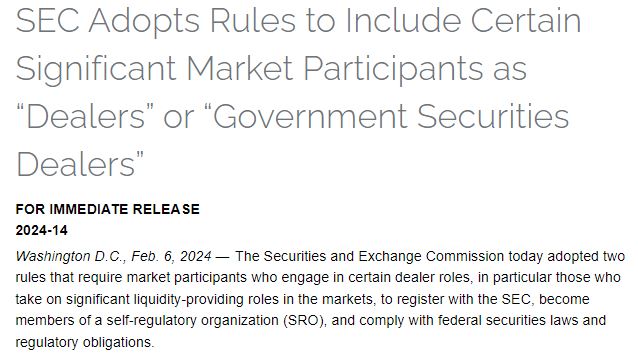The U.S. Securities and Exchange Commission (SEC) is expanding the definition of dealer and requesting jurisdiction over cryptocurrency and decentralized finance (DeFi) companies.
On the 6th (local time), the SEC mandated that “market participants who act as certain dealers, particularly those who provide significant liquidity in the market, register with the SEC and become members of self-regulatory organizations (SROs) to comply with federal securities laws and regulatory obligations.” “We have adopted two rules,” the official announced.
“This action, which requires companies that act like dealers to register with the Commission as dealers, protects investors and promotes the integrity, resilience and transparency of our markets,” said SEC Chairman Gary Gensler.
“It is inconsistent with the intent of Congress to apply registration and regulatory requirements to only a subset of dealers,” he said. “Unless there is an exemption or exception, anyone who transacts in a manner that creates a de facto market must register as a dealer.”

“The dealer rule is a functional analysis based on securities trading activity conducted by a single individual rather than the ‘type of security’ being traded,” the SEC said in its rule explanation. “They are not excluded from applying the rules,” he said.
In the document, the securities authorities mentioned the opposing opinions and concerns raised by cryptocurrency and DeFi industry officials, but stated that they could not accept them.
The SEC said, “There were some opinions that the proposed dealer rule should not be applied to DeFi, but whether dealer involvement in a specific transaction or structure is determined based on an analysis of the facts and circumstances,” and added, “The use of smart contracts ‘distributed ledger technology (DLT)’ “There was nothing in the protocols and other technologies used to determine that crypto asset securities activities did not fall within the category of dealer activities,” he said.
The securities authorities said, "We also considered separately regulating cryptocurrency," but added, "We judged that this would give cryptocurrency companies an advantage over companies required to register, resulting in a negative competitive effect."
Regarding the dealer rule, which will be fully implemented from April next year, the cryptocurrency industry is concerned that it is an unenforceable regulation due to the nature of the technology.
DeFi Education Fund (DEF), which opposed the proposed rule, criticized the authorities for creating an unworkable and flawed rule.
“The SEC failed to understand the industry’s real concerns and failed to provide a clear path for DeFi market participants to comply with regulations,” the organization said in a statement. “It is unrealistic, wrong regulation, and anti-innovation,” he argued.
Opposition to the rulemaking also emerged within the SEC.
“Under the SEC’s approach, anyone who buys and sells securities as part of their day-to-day business could be a ‘dealer,’” Commissioner Mark Ujeda said. “This creates additional regulatory confusion for other markets, including crypto-asset securities.” did.
Commissioner Hester Pierce also pointed out, “The rule has little consideration for actual application in the cryptocurrency market.”
Notice of adoption of the final rule will be published in the Federal Register, and the rule will become effective 60 days after publication. Implementation of the rule is required one year after its effective date.









